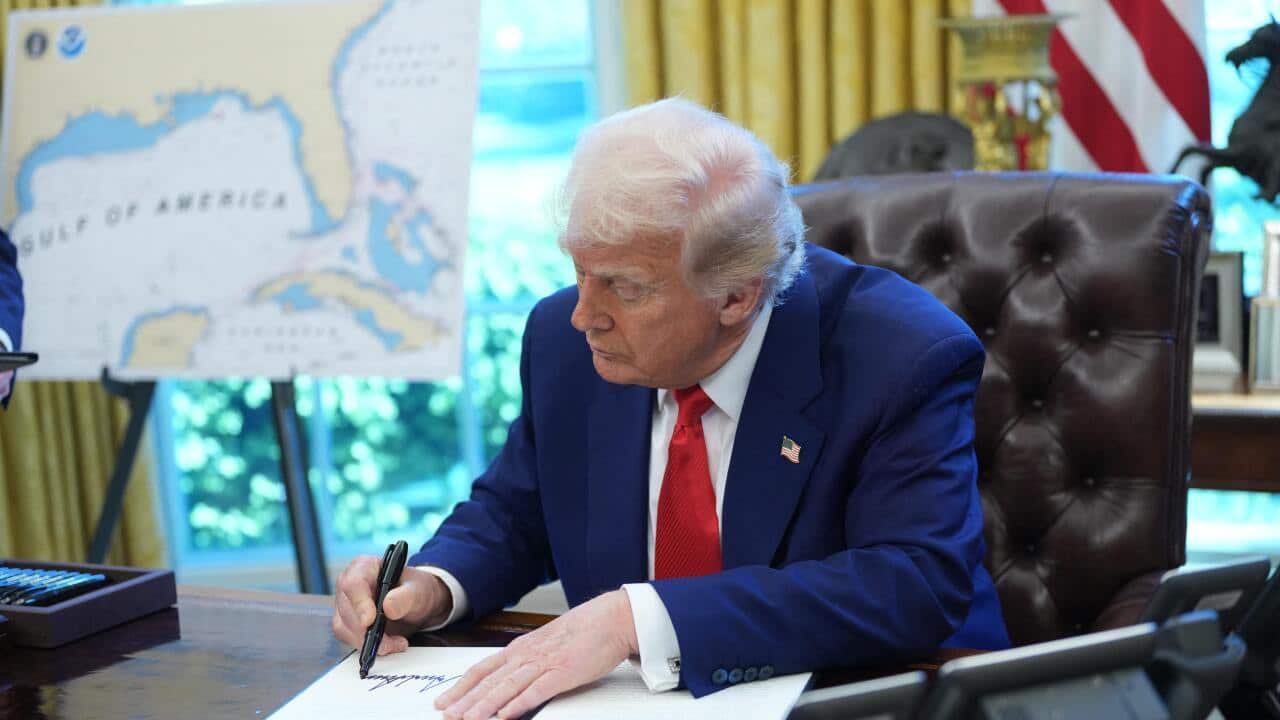As United States President Donald Trump's tariff war continues, the next thing he may have his sights set on is a little cartoon dog named Bluey.
This week, Trump announced he would be pursuing a 100 per cent tariff on all movies "produced in foreign lands".
"The movie industry in America is dying a very fast death. Other countries are offering all sorts of incentives to draw our filmmakers and studios away from the United States," he wrote on his Truth Social platform over the weekend.
While there aren't concrete details on how this tariff would be executed, those in the Australian filmmaking scene are already "shocked and surprised".
'A tax on Bluey'
This week, Australia's ambassador to the US, Kevin Rudd, criticised Trump's proposed tariff, saying: "I don't think we want to see a tax on Bluey."
"What happens if we all lock down our countries with competitive, punitive arrangements against each other’s movies?" he said.
"Movies are the way in which we kind of understand each other more. So I’d be all for opening this up."
Rudd also criticised Trump's sweeping tariffs on countries around the world, including the uninhabited .
"If you've seen the other great Australian movie, Happy Feet — you know, the penguins — those penguins of ours have just been tariffed down in Heard and Macquarie [sic] Island in Antarctica," he said.
"They’re producing a sequel, it's called Unhappy Feet. There'll be a march of penguins on Washington."

Former Prime Minister Kevin Rudd has urged United States President Donald Trump not to "tax" Bluey as he floats a 100 per cent tariff on all international films. Source: AAP / Ludo Studio
What impact would tariffs have on Australia's film industry?
Professor Mark Ryan, professor in film and screen at the Queensland University of Technology, said the tariffs could be a "massive disruption" to both the international and Australian film scene.
"The film industry is increasingly a global system, and so a lot of the major studios, but also the major streamers and even independent movies, increasingly produce at least an aspect of their film overseas," he told SBS News.
"If some type of tariff or tax or levy is applied to these movies, the cost of production is likely to become more expensive."
US production companies often outsource production and post-production efforts to other countries, which are often a cheaper alternative. A large proportion of these production houses in Australia rely on international films to stay afloat, Ryan said.
In Australia, there could be a big impact depending on whether the tariff would apply solely to theatrical releases or all international films and TV shows.

Australia could risk losing millions of dollars a year if Donald Trump were to go ahead with plans to tariff international movies. Source: SBS News
Just under half of the $1.7 billion spent on screen production in Australia during 2023-24 was on international productions, with $767 million spent making foreign films and television.
"If it does include both film and TV, that's a massive chunk of the industry that we lose," Ryan said. "That's a lot of jobs that will be lost."
Industry peak body Screen Producers Australia (SPA) said the move would send "shockwaves" through the industry globally.
SPA chief executive Matthew Deaner said: "At this stage, it is unclear what this announcement means in practice or how it will be applied and implemented."
"There are many unknowns for our industry, but until we know more, there's no doubt it will send shockwaves worldwide."
'Shock and surprise'
Several Australian politicians have already spoken out against the proposal, including NSW Premier Chris Minns.
"It's a massive shame, a real kick in the guts to a great industry," he said on Wednesday.
"The madness coming out of the United States, surely it can't stick around forever. Ultimately, either this administration will pass or common sense will prevail."
Arts Minister Tony Burke said: "Nobody should be under any doubt that we will be standing up unequivocally for the rights of the Australian screen industry."
More locally, the reaction is one of anxiety.
"There is genuine shock and surprise," Ryan said.
"There's a lot of uncertainty and a lot of people are worried because … people rely on these international movies for their bread and butter employment."
Straight to streaming
So, could it affect your weekly cheap movie night? In some ways, yes.
Should a tariff on international films go ahead, there could be fewer blockbuster movies showing in your local theatre.
"I think any taxes on production will lead to a reduction in the amount of movies being made for theatrical release," Ryan said. "Therefore, studios will just focus on making more movies and television programs for streaming platforms."
"We could feasibly see a reduction in the number of big-scale blockbusters being made and we could see lower-budget movies being made," he said.
"We could see more of the Netflix-style straight-to-streaming type movies being made, and all of that will lower the quality."
Thankfully, Australians should be immune to any price increases at the movie theatre.
But our friends in the US might not fare as well.
"There is a model in France where the French government taxes movie tickets and that money from the tax goes into a fund that then funds domestic production," Ryan said.
If Trump were to adopt a similar tax-style model, that could mean movie ticket prices for international films, including Australian ones, could rise in the US.
Ryan said at this stage, it's difficult to ascertain whether the tariff will go ahead and if it does, what it would look like. But already, it's having an impact on the industry.
"Just the fact that the statement has been made is already having a chilling effect on the industry in terms of making decisions about future production investment. It's already destabilised the industry somewhat and it's unclear what the intentions of the tariffs are.
"It could be that Trump has an issue with Hollywood and that these tariffs are designed as a shot across the bow and a signal he will regulate them should they continue to do things that he doesn't approve of.
"There could also be a desire to return all production back to America, but that's going to be very difficult. It's not in the interest of studios and it will make production more expensive for them."






